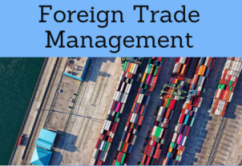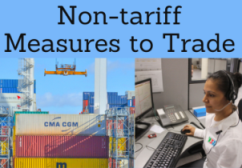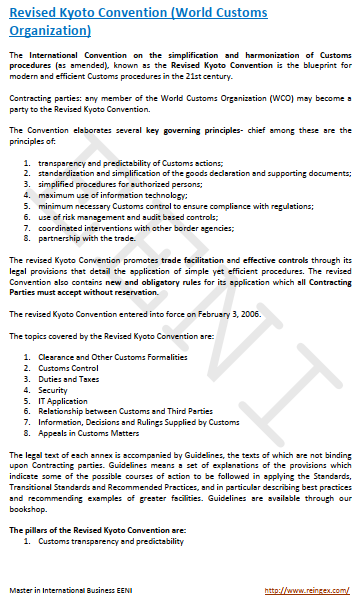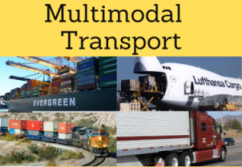Revised Kyoto Convention (WCO) Customs

Kyoto Convention (Simplification and harmonization of Customs procedures)
- Introduction to the Revised Kyoto Convention (International Convention on the simplification and harmonization of Customs procedures) of the World Customs Organization
- Benefits of the Revised Kyoto Convention: Trade Facilitation
- Contracting Parties to the Revised Kyoto Convention
- Topics covered by the Revised Kyoto Convention
The objectives of the subject «Revised Kyoto Convention» are the following:
- Understand the objectives, pillars and benefits of the Revised Kyoto Convention programs
- Evaluate the impact of the Revised Kyoto Convention on Trade Facilitation (Cross-border movement of goods)

The Subject «Revised Kyoto Convention» belongs to the following Online Programs taught by EENI Global Business School:
Courses: Foreign Trade Management, Foreign Trade Assistant, Non-tariff Measures to Trade.

Logistics Courses: International Transport, Maritime Transport, Multimodal, Road, Rail, Transport in Africa.
Diplomas: Foreign Trade, International Transport.

Masters: International Business, Foreign Trade, International Transport, Transport in Africa.
Doctorate: Global Logistics, World Trade.
Languages:  or
or  Convention de Kyoto révisée
Convention de Kyoto révisée  Convenio de Kyoto Revisado
Convenio de Kyoto Revisado  Convenção de Quioto Revisada.
Convenção de Quioto Revisada.
Area of Knowledge: Foreign Trade.


Revised Kyoto Convention
The main objective of the Revised Kyoto Convention is to improve the customs procedures promoting trade facilitation (Cross-border movement of goods) and effective controls establishing a set of compulsory rules for the contracting parties (importers, exporters, logistics operators, customs administration) that must accept without reservation.
Revised Kyoto Convention:

- The revised Kyoto Convention benefits all modes of transport
- The revised Kyoto Convention help governments to deal with the new challenges of electronic commerce
- Entry into force of the Revised Kyoto Convention: February 3, 2006
The pillars of the Revised Kyoto Convention are:
- Customs transparency and predictability
- Simplification and standardization of the product declaration and related import-export documents
- Reduction of Customs control to the minimum
- Simplification procedures for authorized people
- Development of risk management and audit controls
- Coordination between cross-border agencies
The topics covered by the Revised Kyoto Convention are:
- Clearance and Other Customs Formalities
- Customs Control
- Duties and Taxes
- Security
- IT Application
- Relationship between Customs and Third Parties
- Information, Decisions and Rulings Supplied by Customs
- Appeals in Customs Matters
Contracting parties: any member of the WCO may become a party to the Revised Kyoto Convention.
See also:
- World Trade Organization (WCO)
- Customs and WTO
- Preshipment Inspection
- Agreement on Preshipment Inspection
- Technical Barriers to Trade
- Non-automatic Import licensing, quotas and prohibitions
- Sanitary and Phytosanitary Measures
- Agreement on the Application of Sanitary and Phytosanitary Measures
- Safeguards
- Agreement on Safeguards (SG)
- CMR Convention, CIM Convention, Electronic Air Waybill (e-AWB), Electronic FIATA Bill of Lading, TIR Convention, International Chamber of Shipping, International Road Transport Union (IRU), International Union of Railways (UIC), International Civil Aviation Organization (ICAO. Chicago Convention), International Maritime Organization (IMO)..

FIATA Transport Documents.
- Negotiable Combined Transport Bill of Lading (FBL)
- FIATA Multimodal Waybill FWB
- e-Bill of Lading
- Forwarders Certificate of Receipt (FCR)
- Forwarders Certificate of Transport (FCT)
- Warehouse Receipt
(c) EENI Global Business School (1995-2024)
We do not use cookies
Top of this page



